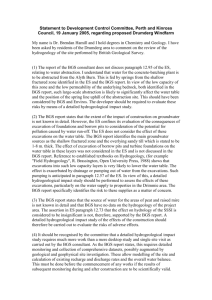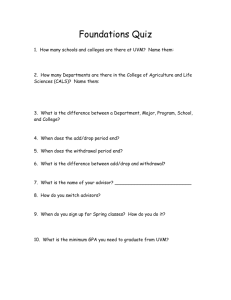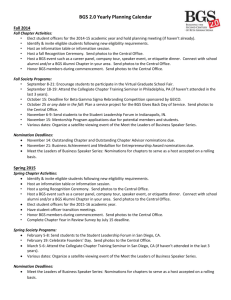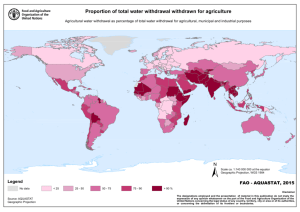Meeting of the College Academic Council
advertisement
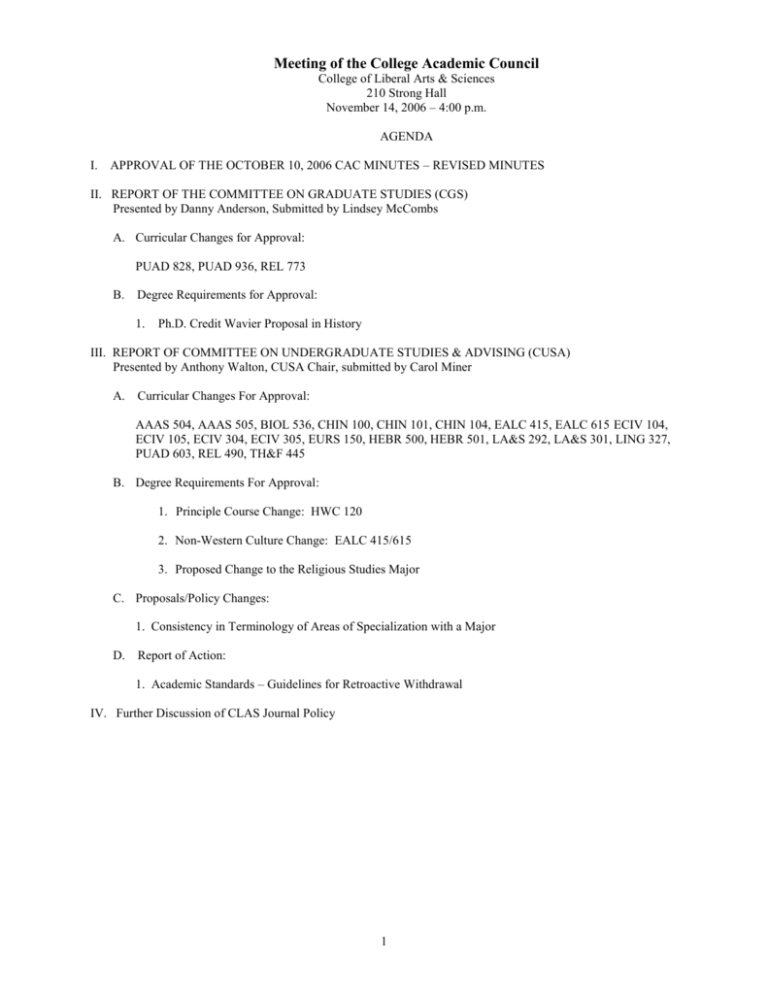
Meeting of the College Academic Council College of Liberal Arts & Sciences 210 Strong Hall November 14, 2006 – 4:00 p.m. AGENDA I. APPROVAL OF THE OCTOBER 10, 2006 CAC MINUTES – REVISED MINUTES II. REPORT OF THE COMMITTEE ON GRADUATE STUDIES (CGS) Presented by Danny Anderson, Submitted by Lindsey McCombs A. Curricular Changes for Approval: PUAD 828, PUAD 936, REL 773 B. Degree Requirements for Approval: 1. Ph.D. Credit Wavier Proposal in History III. REPORT OF COMMITTEE ON UNDERGRADUATE STUDIES & ADVISING (CUSA) Presented by Anthony Walton, CUSA Chair, submitted by Carol Miner A. Curricular Changes For Approval: AAAS 504, AAAS 505, BIOL 536, CHIN 100, CHIN 101, CHIN 104, EALC 415, EALC 615 ECIV 104, ECIV 105, ECIV 304, ECIV 305, EURS 150, HEBR 500, HEBR 501, LA&S 292, LA&S 301, LING 327, PUAD 603, REL 490, TH&F 445 B. Degree Requirements For Approval: 1. Principle Course Change: HWC 120 2. Non-Western Culture Change: EALC 415/615 3. Proposed Change to the Religious Studies Major C. Proposals/Policy Changes: 1. Consistency in Terminology of Areas of Specialization with a Major D. Report of Action: 1. Academic Standards – Guidelines for Retroactive Withdrawal IV. Further Discussion of CLAS Journal Policy 1 I. APPROVAL OF THE OCTOBER 10, 2006 CAC MINUTES – REVISED MINUTES College of Liberal Arts & Sciences College Academic Council October 10, 2006 Minutes The meeting was called to order by Dean Steinmetz. CAC voted and approved BINF 701, BINF 702, BIOL 807, BIOL 808, LING 727, LING 897, LING 898, LING 925, LING 992, LING 998, MATH 881, MATH 882, and PHSX 731. CAC voted and approved the M.A. in Linguistics. CAC voted and approved the Ph.D. in Linguistics. CAC voted and approved the New Joint Degree Program with East Asian Languages and Cultures and the School of Law. CAC voted and approved ECON 536, EURS 350, EURS 536, EVRN 433, EVRN 526, GEOG 433, GEOG 526, HWC 111, HWC 120, LING 326, LING 435, LING 437, LING 438, LING 440, LING 441, LING 525 (see below), REL 440, SPAN 322, TH&F 383, TH&F 387, and TH&F 388. There was a request to table EURS 150 to address some concerns from the language departments. CAC voted to table the course proposal. CAC voted and approved a principal course change for HWC 111. CAC voted and approved a Non-Western Culture change for REL 440. CAC amended the Junior/Senior Concentration Requirement Proposal description by adding the acronym CLAS to specify the department. CAC then voted and approved the new Junior/Senior Concentration Requirement Proposal. See new proposal below. Proposed junior/senior concentration requirement The junior/senior concentration requires a minimum of three upper-level courses (numbered 300 or above) totaling at least 9 credit hours in one CLAS department outside the CLAS major, or in one major or minor in a school outside the College of Liberal Arts and Sciences. Dean Steinmetz then led a discussion with members of CAC concerning College support for journals and journal editors. The members of CAC affirmed that journal editing was an activity that should be supported to some extent by the College. Possible guidelines for support were discussed. Dean Steinmetz indicated that he would compile a list of possible criteria for the support of journals and journal editors for the next CAC meeting. The meeting was adjourned at 5:08 p.m. _______________________________________ It has come to our attention that there are two typos in the October College Academic Council Agenda. Both mistakes were made on the LING 525 change of course description, number and title on the top of page 18. It was approved as: CHANGE: COURSE DESCRIPTION/NUMBER/TITLE LING 525 INTRODUCTION TO SYNTAX (3) S (OLD) An introduction to generative syntax with special attention to theory and method. The course will cover such topics as phrase structure, X-bar theory, pronoun reference and the lexicon. Prerequisite: An introductory course in linguistics. 2 LING 525 (NEW) SYNTAX I (3) S An introduction to generative syntax with special attention to theory and method. The course covers such topics as phrase structure, the lexicon, transformations and derivation. Prerequisite: An introductory course in linguistics. The two items that need to be modified are the course number (changed from LING 525 to LING 325), and the letter designation (changed from S to H). The original course designation was an "H", and the change to "S" was unintentional. LING 325 was typed incorrectly while formatting the agenda. This course should read: CHANGE: COURSE DESCRIPTION/NUMBER/TITLE LING 525 INTRODUCTION TO SYNTAX (3) H (OLD) An introduction to generative syntax with special attention to theory and method. The course will cover such topics as phrase structure, X-bar theory, pronoun reference and the lexicon. Prerequisite: An introductory course in linguistics. LING 325 (NEW) SYNTAX I (3) H An introduction to generative syntax with special attention to theory and method. The course covers such topics as phrase structure, the lexicon, transformations and derivation. Prerequisite: An introductory course in linguistics. 3 II. REPORT OF THE COMMITTEE ON GRADUATE STUDIES (CGS) Presented by Danny Anderson, Submitted by Lindsey McCombs A. Curricular Changes for Approval: PUAD 828 PUAD 936 REL 773 B. NEW COURSE NONPROFIT MANAGEMENT AND POLICY (3) This course focuses on the economic, social, and legal foundations of the nonprofit sector. Nonprofits are examined in the context of a three-sector economy, with emphasis on the ways in which nonprofits compensate for market failures and government failures. The course examines government-nonprofit relations in the modern welfare and offers an in-depth examination of the health, education, and welfare functions as performed by nonprofits. This course also provides exposure to selected topics in nonprofit management such as grant writing, board relations, advocacy, fundraising and volunteer management. LEC NEW COURSE POLICY ANALYSIS AND PROGRAM EVALUATION (3) This course examines the theoretical foundations and analytical components of policy analysis and program evaluation, common tools for assessing alternative courses of public action and program effectiveness. This examination will include a review and critique of common quantitative and qualitative approaches, including cost-benefit analysis, cost-effectiveness analysis, and quasiexperimental design. LEC NEW COURSE SEMINAR IN RELIGION & NATIONAL IDENTITY: ______________ (3) Analysis of selected issues wherein religion and the formation and definition of a selected nation or nations intersect. (LEC) Degree Requirements for Approval: 1. Ph.D. Credit Wavier Proposal in History - STATE PROPOSAL IN DETAIL The PhD is History currently requires 33 credit hours of course work, both for students who enter the program with a BA and for those who enter with the MA. This proposal will allow students to the History Department at KU with an MA degree from another institution to satisfy up to 12 credit hours (at the department's discretion) of the 33 on the basis of coursework from their MA programs. (Students who complete the MA degree at KU already are permitted to count that coursework towards the PhD). Specifically, the department will modify one paragraph concerning degree requirements in the Graduate Catalog: Old language: In addition to the general requirements of the Graduate School, the following departmental requirements must be met. A minimum of 11 courses (33 credit hours) is required for the Ph.D. Students may choose between two options for their course work… New language: In addition to the general requirements of the Graduate School, the following departmental requirements must be met. A minimum of 11 courses (33 credit hours) is required for the Ph.D. Students with master's degrees in history or related disciplines from other universities may satisfy part of this requirement with up to 12 hours from their master's programs. Students may choose between two options for their course work… 4 - STATE JUSTIFICATION FOR MAKING CHANGES The PhD in History currently requires 33 credit hours of course work. This proposal would allow students to satisfy up to 12 credit hours (at the department's discretion), on the basis of coursework from their MA program. We use the model of Communication Studies (as recommended by Dean Diana Carlin) to rewrite our PhD degree requirements to make it possible for some portion of a student's credits from the MA to be counted towards our PhD. We set an upper limit at 12 credit hours (4 courses), because we wish to preserve a decided "KU mark" on the students' training. We reserve the department's prerogative to decide how much credit (if any) should be granted on a case-by-case basis because sometimes the MA training will not fully meet our expectations (although often it will). We do not specify a requirement that the MA courses match one-for-one with ours, because we recognize that students may have taken valuable courses that we are unable to offer at KU. - EFFECTIVE DATE. Unless otherwise requested by the department and approved by CGS and College Assembly, the new requirements will apply to students whose KU initial term is the one immediately following final approval of the requirements. This change in the graduate program has been discussed in the department, with universal approval, since 2004. The department passed the change in 2005, specifying that current students would be eligible to take advantage of its provisions. The department duly submitted the proposal to the College last academic year, but it appears to have been misplaced. Under the circumstances, it is appropriate for the proposed revision to apply to current students. - CONSULTATION WITH OTHER DEPARTMENTS/SCHOOLS OF THE UNIVERSITY No other unit is affected by this change. III. REPORT OF COMMITTEE ON UNDERGRADUATE STUDIES & ADVISING (CUSA) Presented by Anthony Walton, CUSA Chair, submitted by Carol Miner A. Curricular Changes For Approval: AAAS 504 AAAS 505 NEW COURSE DIRECTED LANGUAGE STUDY I: (3) U Study of an African language at Advanced I and Advanced II levels under individual supervision and with the aid of self-instructional material. Open only to juniors and seniors in good standing, graduate students and with permission of the department. May be repeated for up to 6 credit hours. Cannot be used to fulfill BA language requirement. NEW COURSE DIRECTED LANGUAGE STUDY II: (3) U Designed for native and near native speakers, this course involves reading of materials published in an African language intended for conversation, oral presentation, and writing by native speakers. Prerequisite: Native or near native speaker proficiency or consent of instructor. May be repeated for up to 6 credit hours. 5 BIOL 536 (OLD) BIOL 536 (NEW) CHIN 100 (OLD) CHIN 100 (NEW) CHIN 101 (OLD) CHANGE: COURSE DESCRIPTION CELL STRUCTURE AND FUNCTION (HONORS) (3) N Lecture and discussion course for highly qualified and motivated students to provide a more thorough treatment of the topics covered in BIOL 416. Students enrolled in BIOL 536 attend the BIOL 416 lectures and an additional 1.5-2.0 hour tutorial period devoted to the discussion of advanced topics and the development of problem solving skills. Exams will be separate from BIOL 416. Open to students in the Honors program or by permission of instructor. Prerequisite: BIOL 350. CELL STRUCTURE AND FUNCTION (HONORS) (3) N BIOL 536 is the honors version of BIOL 416. Completion of this class will satisfy the BIOL 416 requirement. Open to students in the Honors program or by permission of instructor. Prerequisite: BIOL 350 or consent of instructor. CHANGE: COURSE DESCRIPTION , TITLE MODERATED BEGINNING CHINESE I (3) U Three hours of class per week plus outside use of tape recorded drill materials. An introduction to Mandarin Chinese (Gwo Yu), the national language of China. Familiarity with the basic structural patterns of the language is stressed through general conversation. ELEMENTARY CONVERSATIONAL CHINESE I (3) U Three hours of class per week plus outside use of recorded text materials. Basic spoken language instruction intended primarily for beginners planning travel or work in China and Taiwan. Introduction to basic written characters. Does not fulfill College of Liberal Arts and Sciences foreign language distribution requirements or department major and minor requirements. CHANGE: COURSE DESCRIPTION, TITLE MODERATED BEGINNING CHINESE II (3) U Continuation of CHIN 100. In addition to the general conversational Chinese, the students also learn to recognize a list of most commonly used Chinese characters. Completion of this course is approximately equivalent to completion of CHIN 104. Prerequisite: CHIN 100 or equivalent. CHIN 101 (NEW) ELEMENTARY CONVERSATIONAL CHINESE II (3) U Continuation of CHIN 100. Prerequisite: CHIN 100 or equivalent. CHIN 104 (OLD) CHANGE: COURSE DESCRIPTION ELEMENTARY CHINESE I (5) U Five hours of class and two of drill in the spoken language each week. Grammar and readings in selected texts. CHIN 104 (NEW) ELEMENTARY CHINESE I (5) U Three hours of lecture and three hours of spoken drill each week. An introduction to spoken and written modern standard Chinese (Mandarin). Not open to students with native ability in Mandarin or Chinese dialect. Students who have any previous knowledge of Chinese must take a placement exam before enrolling in Chinese classes at K.U. Consult Department of East Asian Languages and Cultures for details. 6 EALC 415 EALC 615 ECIV 104 (OLD) ECIV 104 (NEW) ECIV 105 (OLD) ECIV 105 (NEW) NEW COURSE ANCIENT CHINA (3) H A topic-based course on the culture of ancient China (Shang dynasty to Han). Topics include: agriculture, writing, myth, economy, politics, ritual, thought, art and literature. Readings include primary sources and contemporary scholarship. Students will research selected topics in depth. Assignments will include written reactions to readings, exercises in research skills, essays, and quizzes. A knowledge of Chinese is not required. Not open to students who have completed EALC 615. Additional assignments will be required for students enrolled at the 600 level. NEW COURSE ANCIENT CHINA (3) H A topic-based course on the culture of ancient China (Shang dynasty to Han). Topics include: agriculture, writing, myth, economy, politics, ritual, thought, art and literature. Readings include primary sources and contemporary scholarship. Students will research selected topics in depth. Assignments will include written reactions to readings, exercises in research skills, essays, and quizzes. A knowledge of Chinese is not required. Not open to students who have completed EALC 415. Additional assignments will be required for students enrolled at the 600 level. CHANGE: COURSE DESCRIPTION EASTERN CIVILIZATIONS (3) HL, NW An introductory course designed to acquaint the student with the broad outlines of the traditional cultures and literatures of India, China, and Japan. By reading translations of original source materials, the student will be able to see the interaction between these three cultures aswell as their essential continuity. The course is most appropriate for students without any background in Asian culture. EASTERN CIVILIZATIONS (3) HL, NW An introductory course designed to acquaint the student with the broad outlines of the traditional cultures and literatures of East Asia. By reading translations of original source materials, the student is able to see the interaction among the various cultures as well as their essential continuity. The course is most appropriate for students without any background in Asian culture. Not open to students who have completed ECIV 304. CHANGE: COURSE DESCRIPTION EASTERN CIVILIZATIONS, HONORS (3) HL, NW An introductory course designed to acquaint the student with the broad outlines of the traditional cultures and literatures of India, China, and Japan. By reading translations of original source materials, the student will be able to see the interaction between these three cultures as well as their essential continuity. The course is most appropriate for students without any background in Asian culture. Offered for students with superior academic records. EASTERN CIVILIZATIONS, HONORS (3) HL, NW An introductory course designed to acquaint the student with the broad outlines of the traditional cultures and literatures of East Asia. By reading translations of original source materials, the student is able to see the interaction among the various cultures as well as their essential continuity. The course is most appropriate for students without any background in Asian culture. Offered for students with superior academic records. Open only to students in the University Honors Program or by permission of instructor. 7 ECIV 304 (OLD) ECIV 304 (NEW) ECIV 305 (OLD) ECIV 305 (NEW) EURS 150 HEBR 500 (OLD) CHANGE: COURSE DESCRIPTION EASTERN CIVILIZATIONS (3) HL, NW An introductory course designed to acquaint the student with the broad outlines of the traditional cultures and literatures of India, China, and Japan. By reading translations of original source materials, the student will be able to see the interaction between these three cultures as well as their essential continuity. The course is most appropriate for students without any background in Asian culture. Same as ECIV 104, but there will be some additional work appropriate to a 300level course. EASTERN CIVILIZATIONS (3) HL, NW An introductory course designed to acquaint the student with the broad outlines of the traditional cultures and literatures of East Asia. By reading translations of original source materials, the student is able to see the interaction among the various cultures as well as their essential continuity. The course is most appropriate for students without any background in Asian culture. Same as ECIV 104, but there will be additional work appropriate to a 300-level course. CHANGE: COURSE DESCRIPTION EASTERN CIVILIZATIONS, HONORS (3) HL, NW An honors section. An introductory course designed to acquaint the student with the broad outlines of the traditional cultures and literatures of India, China, and Japan. By reading translations of original source materials, the student will be able to see the interaction between these three cultures as well as their essential continuity. The course is most appropriate for students without any background in Asian culture. Same as ECIV 105, but there will be some additional work appropriate to a 300-level course. Offered for students with superior academic records. EASTERN CIVILIZATIONS, HONORS (3) HL, NW An introductory course designed to acquaint the student with the broad outlines of the traditional cultures and literatures of East Asia. By reading translations of original source materials, the student is able to see the interaction among the various cultures as well as their essential continuity. The course is most appropriate for students without any background in Asian culture. Similar to ECIV 304, but reading and writing assignments reflect the fact that this is an honors course. Open only to students in the University Honors Program or by permission of instructor. NEW COURSE STUDY ABROAD TOPICS IN EUROPEAN STUDIES: _________ (1-5) U This course is designed for the study of special topics in European Studies at the 100-level (Freshman/Sophomore level). Coursework must be arranged through the KU Office of Study Abroad and approved by a faculty advisor in European Studies. May be repeated for credit if content varies. CHANGE: PREREQUISITE, NUMBER, DESCRIPTION BIBLICAL HEBREW (3) H This course introduces students to the grammatical structure and vocabulary of biblical Hebrew. It includes basic biblical texts for students to translate into English and to analyze. Prerequisite: One year of Israeli Hebrew, its equivalent, or permission of the instructor. 8 HEBR 230 (NEW) HEBR 501 (OLD) HEBR 240 (NEW) LA&S 292 LA&S 301 (OLD) LA&S 301 (NEW) LING 327 BIBLICAL HEBREW 3 H This course introduces students to the grammatical structure and vocabulary of biblical Hebrew. It includes basic biblical passages for students to translate into English and analyze. CHANGE: PREREQUISITE, NUMBER BIBLICAL HEBREW II 3 H This is a continuation of Hebrew 500. It continues a study of the grammatical structure and vocabulary of biblical Hebrew, and includes biblical texts for translation and to analyze. Prerequisite: HEBR 500 or permission of the instructor. BIBLICAL HEBREW II 3 H This is a continuation of Hebrew 230. It continues the study of the grammatical structure and vocabulary of biblical Hebrew, and includes biblical texts for students to translate and analyze. Prerequisite: HEBR 230 or permission of the instructor. CHANGE: NEW TOPIC TOPICS AND PROBLEMS ON: INTRODUCTION TO MATHEMATICS AND SCIENCE TEACHING (1) N The aim of this course is to attract students majoring in science, mathematics, or engineering to careers in secondary science and mathematics teaching. Experienced, award-winning teachers introduce teaching to students as a career. Students prepare, practice, and teach three lessons in local schools. This course is open to any student who has completed or is concurrently enrolled in a science or mathematics course at KU. CHANGE: TITLE , TOPIC LEARNING COMMUNITIES SEMINAR LEARNING COMMUNITIES SEMINAR IN:____________ (1-2) U TOPIC - Preparing for International Careers This course is designed to expand student's knowledge of the University community by exploring an academic theme and the connections between courses. Through the study of the different topics students will explore the inherent interdisciplinarity of fields of study. Designed especially for juniors and seniors. Enrollment is limited to students participating in designated learning community. Concurrent enrollment in specified learning community courses is required. May be repeated for credit up to 4 hours. NEW COURSE MORPHOLOGY (3) S An exploration of several topics in word structure and formation. Covers three broad areas: traditional morphology, morpho-phonology, and morpho-syntax. Traditional morphology includes a survey of several kinds of word formation processes, the internal structure of words, morpheme types, inflection, paradigms, derivation, and compounding. Morpho-phonology deals with phonological constraints on morphological processes and prosodic morphology. Morpho- syntax concentrates on the syntactic properties of morphological phenomena and interaction of syntactic processes and morphology. The course has a strong emphasis on cross-linguistic comparative morphology. Prerequisites: Ling 312, Ling 325, or permission of instructor. 9 PUAD 603 (OLD) PUAD 603 (NEW) REL 490 TH&F 445 (OLD) TH&F 445 (NEW) CHANGE: COURSE DESCRIPTION THE NONPROFIT SECTOR:FORMATION, LEADERSHIP, AND GOVERNANCE (3) A political economy perspective is used to analyze the forces that shape the rise and characteristics of the nonprofit sector. The social history of the nonprofit sector in the U.S. is examined. The legal and policy environments are explored and the distinct organizational forms are examined. A comparative perspective is provided between the U.S. and other countries. Emphasis on various patterns of community action for attaining social welfare objectives; research and field experience directed toward study of social problems within context of community planning; and emerging patterns of physical, economic, and social planning within the framework of social change theory. Prerequisites: PUAD 330 or PUAD 331, and PUAD 332 THE NONPROFIT SECTOR: FORMATION, LEADERSHIP, AND GOVERNANCE (3) This course focuses on the economic, social, and legal foundations of the nonprofit sector. Nonprofits are examined in the context of a three-sector economy, with emphasis on the ways in which nonprofits relate to the public and private sectors. The course examines the diversity and scope of the nonprofit sector, with primary focus on the health, education and welfare functions performed by nonprofits and on various patterns of community action for attaining social welfare objectives. Prerequisites: PUAD 330 or PUAD 331, and PUAD 332 NEW COURSE SENIOR SEMINAR IN THEORIES AND METHODS (3) H A capstone course for religious studies majors to survey methods and theories in religious studies. Prerequisite: Religious Studies major or permission of the instructor. CHANGE: PREREQUISITE TEACHING THEATRE IN THE MIDDLE/SECONDARY SCHOOLS (3) H Study of philosophy and methods appropriate to teaching improvisation, acting, stagecraft, directing, playwriting, dramatic literature, and theatre history in middle/secondary schools. Includes curriculum development, instructional and evaluative strategies, and management of co-curricular theatre programs. Prerequisite: T&L 320 Instructional Strategies and Models, or consent of instructor. TEACHING THEATRE IN THE MIDDLE/SECONDARY SCHOOLS (3) H Study of philosophy and methods appropriate to teaching improvisation, acting, stagecraft, directing, playwriting, dramatic literature, and theatre history in middle/secondary schools. Includes curriculum development, instructional and evaluative strategies, and management of co-curricular theatre programs. Prerequisite: Consent of instructor. 10 B. Degree Requirements For Approval: 1. Principle Course Change: HWC 120 ACTION: New Course – Principal Course Designation HWC 120 Introduction to Peace and Conflict Studies (3) HT DESCRIPTION An introduction to the content and methods of peace studies. Peace Studies in a multidisciplinary and interdisciplinary approach to the study of war and peace. Building on and integrating the work of the various fields of study, the course critically examines the causes of structural and direct violence with in and among societies and the diverse ways in which humans have sought peace, from conquest and balance of power to international organizations and nonviolent strategies. Required for the Peace and Conflict Studies minor. JUSTIFICATION This course will introduce students in the Peace and Conflict Studies minor to the methods and strategies of relevant fields of study as well as to basic sources of information on violence and conflict resolution. 2. Non-Western Culture Change: EALC 415/615 ACTION: New Course EALC 415/615 ANCIENT CHINA (3) NW DESCRIPTION A topic-based course on the culture of ancient China (Shang dynasty to Han). Topics include: agriculture, writing, myth, economy, politics, ritual, thought, art and literature. Readings include primary sources and contemporary scholarship. Students will research selected topics in depth. Assignments will include written reactions to readings, exercises in research skills, essays, and quizzes. A knowledge of Chinese is not required. JUSTIFICATION For those interested in an NW course that is broad in scope and but limited to 35 to 40 students, this will offer another junior/senior level choice. This is a new course taught by a new faculty member with a specialty in this field. EALC wants this to become one of his core courses; making it NW will help with enrollment. 3. Proposed Change to the Religious Studies Major PROPOSAL Replace current major requirement REL 601 with REL 490. REASON Department wishes to separate the graduate and undergraduate courses to allow a smaller class for each to enhance the learning experience. REL 601 is required of incoming graduate students. C. Proposals/Policy Changes 1. Consistency in Terminology of Areas of Specialization with a Major The Curricular Changes/Degree Requirements subcommittee proposes the term “Emphasis” be used to describe any concentration, track, option, or specialty area that has not specifically been approved as part of the official degree/major name through official processes. The list below summarizes the current variations of these categories. 11 College of Liberal Arts and Sciences: Majors_Concentrations_Options African /African American Studies BA, BGS Concentrations: African, African-American American Studies BA, BGS Anthropology BA, BGS Applied Behavioral Sciences BA, BGS Specialty areas: Early Childhood, Youth Development and Juvenile Justice, Adults with Disabilities, Community Health and Development, Astronomy BA, BS Atmospheric Science BS Options: General Meteorology, Air Pollution, Hydrometeorology, News Media Forecasting Biological Sciences BA, BGS, BS BA degrees – Biochemistry, Biology, Human Biology, Microbiology BGS degree – Human Biology BS degrees – Biochemistry; Microbiology, Biology with concentrations in Ecology and Evolutionary Biology, Cell Biology, Genetics, Organsimal Biology, and Neurobiology, Molecular Biosciences (Edwards Campus Only) Chemistry BA, BS BA Options – Environmental Chemistry, Biological Chemistry BS Options - Environmental Chemistry, Biochemistry, Chemical Physics Classics BA, BGS Degrees - Classical Antiquity and Classical Languages Communication Studies BA, BGS East Asian Languages and Cultures BA Concentrations: Chinese Language and Literature, Japanese Language and Literature, East Asian Studies Economics BA, BGS, BS English BA, BGS in English Emphases – Traditional English, Creative-writing BA, BGS in Literature, Language and Writing (Edwards Campus Only) Environmental Studies BA, BGS, BS BA and BGS Options - Environmental Science, Environmental Policy BS Options - Environmental Policy, Land Use European Studies Co-Major Tracks – A (Cultural/Historical), B (Economic/Political) French and Italian BA Options – French and Italian Studies, Italian Geography BA, BGS, BS BS Options - Physical Geography, Geographical Information and Analysis Geology 12 BA, BS BA Options - General Geology, Environmental Geology BS Options - General Geology, Engineering Geology, Environmental Geology, Geophysics Germanic Languages and Literatures BA History BA, BGS History of Art BA, BGS Human Development and Family Life (See Applied Behavioral Sciences) Humanities and Western Civilization BA Emphases: Humanities, Literature, Western Civilization International Studies Co-Major Latin American Area Studies BA, BGS Fields of Concentration - Language, Literature and Culture, Historical Studies, Economics, Geography, Political Science and Sociology, Anthropology, Religious Studies and Women’s Studies, Environmental Linguistics BA, BGS Mathematics BA, BS Philosophy BA, BGS Physics BA, BS BA Concentration - Computational Physics BS Degrees – Physics and Engineering Physics Political Science BA, BGS Psychology BA, BGS Psychology BA, BGS Developmental Psychology BS Cognitive Psychology Public Administration (Edwards Campus Only) BA, BGS Religious Studies BA, BGS Russian and East European Studies Co-Major Slavic Language and Literatures BA Concentrations: Russian, Polish Studies, South Slavic Studies Sociology BA, BGS Spanish and Portuguese BA Speech-Language-Hearing: Sciences and Disorders BA, BGS Theatre and Film BA, BGS BA Emphases – Theatre, Film Studies, BGS Emphases – Theatre, Film Studies, Theatre and Film Women’s Studies BA, BGS 13 D. Report of Action: 1. Academic Standards – Guidelines for Retroactive Withdrawl GUIDELINES FOR RETROACTIVE WITHDRAWAL PLEASE NOTE: If you are petitioning for retroactive withdrawal from courses in which you are currently enrolled, you need to continue attending these courses and earning the best possible grades because there is no guarantee that your petition will be approved. You cannot petition to retroactively withdraw from a single course unless a) your enrollment in the course was due to a documented administrative error or b) there exists a serious issue specifically related to that course. Retroactive withdrawal is available to College of Liberal Arts and Science (CLA&S) students or other students petitioning for withdrawal from a single CLA&S course. YOU ARE NOT A CANDIDATE FOR RETROACTIVE WITHDRAWAL IF ANY OF THE FOLLOWING ARE TRUE: • • • • • • You are applying because you are not satisfied with the grade you earned. You are applying because you forgot to withdraw from the course during the term or you failed to get the instructor’s signature by the published withdrawal deadline. You were not aware of the withdrawal deadlines. You changed your mind and are now working towards a major or degree which does not require this course. You assumed non-academic activities which restricted your time for academic pursuit. You were ill or you suffered stress as the result of an accident, death, family crisis, or other crisis early enough in the semester to have withdrawn during the semester. If any of the above are found to be true of your case, your request for retroactive withdrawal will be denied by CLA&S Student Academic Services and will not be reviewed by the Academic Standards Subcommittee of CUSA. YOU ARE A CANDIDATE FOR RETROACTIVE WITHDRAWAL IF AT LEAST ONE OF THE FOLLOWING ARE TRUE: • • • • You are the victim of a documented administrative error that affected your enrollment in one or more courses. You enrolled in KU coursework but did not attend any of your classes because you were enrolled full time at another academic institution. You have documentation of a serious illness that affected your ability to complete all of your coursework after the withdrawal date. You encountered documented extreme and unusual circumstances which a) were beyond your control, b) occurred after the withdrawal date, and c) could not have been addressed during the term in which the course(s) was taken. You received absolutely no feedback on your performance in the course before the last day to withdrawal from the course. Clear administrative error and non-attendance at KU will be handled by CLA&S Student Academic Services and will not have to be reviewed by the Academic Standards Subcommittee of CUSA. If your case meets the above criteria, then you may begin the process of applying for retroactive withdrawal. 14 STEP 1: ASSEMBLING YOUR DOCUMENTATION Listed below are the eligible reasons for applying for retroactive withdrawal. When you submit your petition you must provide the required documentation. Petitions submitted without documentation will be denied. • Withdrawal because of administrative error requires documentation such as printed records, written correspondence, or a written statement from the instructor to verify that either the student never appeared in the class (thus supporting a claim of error in the initial enrollment records) or that the student stopped attending the class after a specific date (thus supporting a claim of having dropped the class prior to the end of the term). Withdrawal based on non-attendance at KU requires written confirmation that you attended full-time at another institution than KU and written confirmation from KU instructors that you never attended any of your classes at KU. Withdrawal based on serious illness (either of the student or of a family member) requires professional documentation about date of onset and offset, severity of the illness, and written assurance that the student’s academic performance was affected by the illness. Withdrawal based on a death requires documentation of the date of death in the form of an obituary or program from the funeral service and information showing the relationship between the student and the deceased. Withdrawal based on extreme and unusual circumstances which were beyond the student’s control requires documentation of these circumstances by someone other than, or in addition to, the student. This documentation should describe the circumstances, relevant dates, and how the events affected the student’s academic performance. Documentation stating how this was beyond the student’s control is also required if not inherent in the previous documentation. Withdrawal based on lack of evaluation requires documentation from the instructor verifying that no graded assignments, no papers, and no tests had been returned by the last drop date. Lack of evaluation cannot be because you failed to attend the class. • • • • • STEP 2: WRITING THE PETITION Your written petition must address the following points. For clarity, please reproduce these points as headings in your written petition. • Which of the four eligible reasons for petitioning for a retroactive withdrawal (see list above) does your case meet? Describe your case paying particular attention to dates and other details provide in your documentation. Did the extenuating circumstances affect all of your courses? Why did you not withdraw during the semester? If you are not requesting withdrawal from all of your courses for the semester, why did the extenuating circumstances affect the courses you are requesting relief from but not others? (The committee does not approve individual courses unless it was due to administrative error or a serious issue that specifically relates to that course.) Did you discuss your problems with the instructors of the classes you are petitioning? If so, what was their response? If not, why not? Did you discuss your problems with anyone at KU other than your instructors (advisor, counselor) during the semester? Describe the interaction. • • • • • • STEP 3: CLA&S SAS WILL OBTAIN DOCUMENTATION FROM THE INSTRUCTOR(S) CLA&S Student Academic Services office will ask your instructors the following questions: What is the last date that you can document that the student attended your class? Approximately what percentage of the assignments did the student complete? Did the student discuss with you any issues that were preventing him/her from doing well in your course? Should the student have been aware of their level of progress before the last day to withdrawal? Would you support a Retroactive Withdrawal for this student? Do you have anything else you would like to include? 15 If the petition is approved would you assign a WP or WF for the Course? If you would like to ask your instructor for a letter of support, you may do so: but you are not required to do so. STEP 4: SUBMIT THE PETITION AND DOCUMENTATION Submit your petition together with all relevant documentation to: CLA&S Student Academic Services 109 Strong Hall 1450 Jayhawk Blvd. Lawrence, KS 66045-7535 STANDARD DECISIONS OF THE ACADECMIC STANDARDS SUB-COMMITTEE • If your retroactive withdrawal is approved you will be withdrawn from all coursework in the effected semester. Withdrawal from individual courses is approved only in the case of documented administrative error or a serious issue specifically relating to that course. • The committee rarely approves multiple semester requests. If multiple semesters are requested then the committee focuses on the first semester or the semester where the extenuating circumstances started. APPEAL PROCEDURES A student may appeal the denial of their petition only if they provide new documentation. Appeals may be forwarded to the full CUSA committee. NOTICE OF PROCEDURAL PRACTICES This notice describes how the information in your petition will be used and disclosed. Each member of the CUSA Academic Standards Subcommittee will receive written copies of your petition or appeal documentation. If you want your identity withheld from the Subcommittee members, please request this in writing. ADMINISTRATIVE PROCEDURES FOR RETROACTIVE WITHDRAWAL • CLAS&S SAS will assign the Academic Standards Advisor the ability to evaluate if the petition falls under the reviewed or non-reviewed category • The Academic Standards Advisor will follow up with the student if any key documentation is missing to make a complete application. • CLA&S SAS will contact instructors with a standard set of questions and any clarification questions that the administer feels is appropriate per the petition. • The Academic Standards Advisor will inform the student and instructor about the outcome and decision of the petition. • CLA&S SAS will communicate approvals to the registrar’s office • The Academic Standards advisor will report to the Academic Standards Sub-committee a years report on all retroactive withdrawal petitions that were approved or denied by the committee and the Academic Standards Advisor 16
